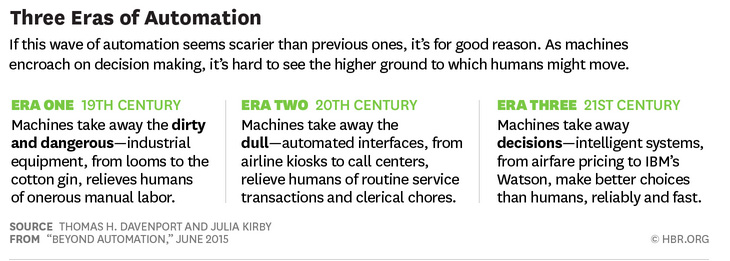Beyond Automation — from hbr.org by Thomas Davenport & Julia Kirby
Excerpt (emphasis DSC):
After hearing of a recent Oxford University study on advancing automation and its potential to displace workers, Yuh-Mei Hutt, of Tallahassee, Florida, wrote, “The idea that half of today’s jobs may vanish has changed my view of my children’s future.” Hutt was reacting not only as a mother; she heads a business and occasionally blogs about emerging technologies. Familiar as she is with the upside of computerization, the downside looms large. “How will they compete against AI?” she asked. “How will they compete against a much older and experienced workforce vying for even fewer positions?”
Suddenly, it seems, people in all walks of life are becoming very concerned about advancing automation. And they should be: Unless we find as many tasks to give humans as we find to take away from them, all the social and psychological ills of joblessness will grow, from economic recession to youth unemployment to individual crises of identity (*DC insert: See my footnote below). That’s especially true now that automation is coming to knowledge work, in the form of artificial intelligence. Knowledge work—which we’ll define loosely as work that is more mental than manual, involves consequential decision making, and has traditionally required a college education—accounts for a large proportion of jobs in today’s mature economies. It is the high ground to which humanity has retreated as machines have taken over less cognitively challenging work. But in the very foreseeable future, as the Gartner analyst Nigel Rayner says, “many of the things executives do today will be automated.”
From DSC:
* These are the types of concerns I was trying to get at when I asked the question: Which street do we care more about, Wall Street or Main Street?
If the we make decisions solely on the basis of the bottom lines and with an eye solely on shareholders, we could have some major issues to deal with. We must consider the effects of automation on Main Street, not just on Wall Street.









